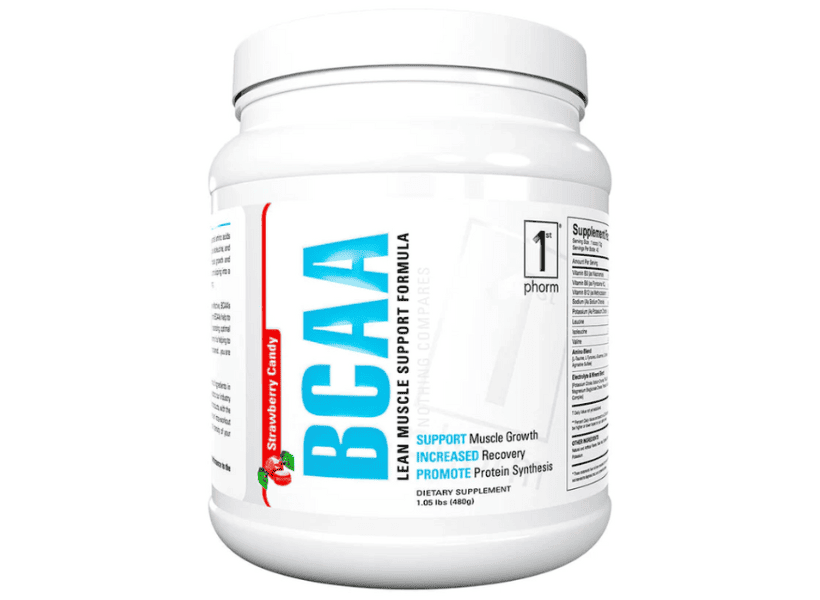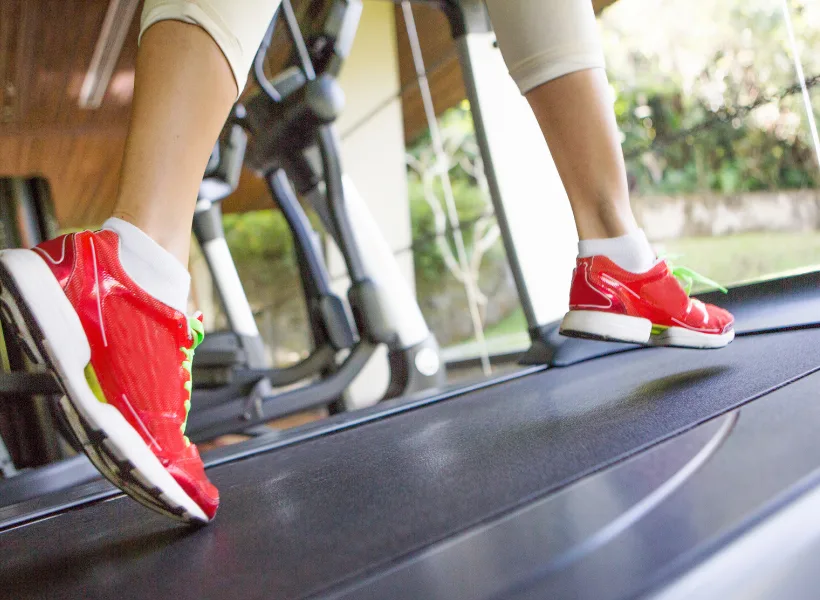Sports nutrition and performance supplements are a growing field that’s getting more complex. When you’re looking at running performance, the waters just get murkier. Stores carry more and more supplements, promising improved results with little merit.
Protein for recovery is a huge part of athletic performance for runners as well as other endurance athletes. However, protein supplements for runners aren’t just basic powders and protein bars that have been around for years. It’s a lot more complicated.
Various amino acid supplements, specifically BCAA for runners, have garnered significant traction for runners of all levels, especially for a long run. Additionally, women over 40 who are getting fit for sometimes the first time in life, or after a number of years, are turning to BCAAs for weight loss and overall better health.

In this guide, we’ll cover the need-to-know information about BCAA for runners so that you can determine whether they could benefit your running performance and increase energy levels.
What are BCAAs
Understanding BCAAs starts with a trip back to high school biology. So, get ready for a refresher.
BCAA is an acronym for Branched Chain Amino Acids. Some of these amino acids are produced by our body, others we can only get through certain foods.
What are Amino Acids
We need proteins. They’re in our food, and to survive and strengthen our bodies, we break them down into 20 different amino acids. Breaking them down doesn’t change based on where the protein comes from- meat, beans, dairy, eggs, fish, vegetables, and even protein powders. Amino acids are the building blocks of protein, and our bodies use them to manufacture their structural and functional proteins.
Our bodies can combine these amino acids to make hundreds of different forms that make up the various proteins we need to function.
What’s more, proteins aren’t just about muscle building. They’re involved in practically every structure and function of our bodies in some way. They’re essential to forming DNA, generating energy, creating neurotransmitters, and fueling white blood cells.
Of the 20 amino acids our body requires, we must consume nine of them in our diet or supplement form because we can’t make them. It is why we call them essential amino acids or EAAs and another reason why getting enough protein plays a vital role to good health.
What are Branched Amino Acids Supplements
Amino acid supplementation (especially for weight loss) frequently centers around these essential amino acids. More specifically, they focus on three certain essential amino acids- leucine, isoleucine, and valine.
We refer to these as branched-chain amino acids or BCAAs because of their chemical structure. Approximately 33 percent of your muscle protein is made up of branched-chain amino acids.
BCAAs in Foods
While the nutrition world focuses on BCAAs for runners in supplements, such as powders, capsules, drink mixes, etc., you can also find them in foods that you can work into your diet.
BCAAs in foods are most prevalent in those high in protein, especially animal sources, such as meat, poultry, fish, and eggs, as well as dairy products like milk, yogurt, and cottage cheese. If you’re looking for plant-based foods with BCAAs, you can check out tofu, beans, lentils, tempeh, and seeds.
BCAA Supplements
BCAA supplements are especially popular among athletes and runners because BCAAs are the amino acids in muscle protein synthesis and can help maintain muscle mass as well as aid in the recovery process.
Research suggests that leucine is responsible for encouraging muscle protein production and inhibiting muscle breakdown. That’s why BCAA supplementation following a run is quite common. Most BCAA supplements for runners offer two times as much leucine as isoleucine or valine. The amino acids commonly exist in a 2:1:1 ratio.

BCAAs before running is also popular because their specific chemical structure allows you to metabolize them quickly. You’re able to break them down via a simpler digestion process than most amino acids and proteins.
BCAAs can also play important roles in cell signaling, regulating glucose and lipid metabolism, synthesizing proteins, improving gut health, and bolstering immunity.
1st Phorm BCAA Supplement
1st Phorm is a supplement company that offers a variety of pre and post-workout mixes, dietary supplements, and meal replacements. Among the collection of products is a BCAA supplement as well as a post-workout Ignition glycogen supplement that pairs well with their amino acid supplements.
Their BCAA supplement is designed for intra-workout consumption and can help encourage fat loss and new muscle construction. The company designed its product to improve recovery and avoid delayed onset muscle soreness.
For more information on the company and a review of their products, check out 1st Phorm Review: Should You Use Supplements?
Benefits of BCAA for Runners and Other Long Workouts
A great deal of research shows exercise and performance benefits when taking BCAAs. Some of the many advantages of incorporating enough BCAAs into your workout or running routine can include:
Supports Muscle Growth & Strength Gains
One of the most common reasons endurance runners turn to BCAAs is their well-established role in encouraging your body’s anabolic, or muscle building, hormones to kick start muscle protein production. BCAAs can help runners retain muscle mass as well as create and restore muscle fibers following their training.
According to a study involving sarcopenia patients who experience muscle loss because of liver cirrhosis, BCAA supplementation significantly improved muscle strength, function, and mass.

Minimize Perceived Exertion & Time to Fatigue
Distance runners work hard to delay their fatigue and hang on as long as they can without losing speed. Because of this fact, any supplement that can improve stamina or allow the runner to feel less tired can improve their overall performance.
Many studies show that BCAAs can minimize perceived exertion, allowing runners to feel less exhausted from their regular exercises.
What’s more, studies show a physiological aspect to this fatigue resistance. BCAAs can help maintain glycogen stores throughout endurance exercise, improving the time to exhaustion. They can also lower lactate production, making a runner’s legs feel less heavy and tired when they’re running and afterward.
Reduce Cortisol Production
According to exercise studies, BCAAs can reduce the harmful effects of the stress hormone cortisol, which can go up in the body when you’re performing intense exercise. When left unmonitored, high levels of cortisol can contribute to muscle breakdown.
Cortisol can also cause the body to hold onto more fat, a common issue for women over 40, making weight loss difficult. Keeping your cortisol levels low can help to stave off unintended weight gain and keep you feeling calm and focused.

28 Day Carb Cycling Meal Plan: 1200-1500 Calories
Looking to get fit and healthy while still enjoying your favorite foods? Look no further than Fit Found Me’s carb cycling meal plan!
Our meal plan is designed to help you achieve your fitness goals by strategically cycling your carbohydrate intake, resulting in increased fat burning and energy levels. Plus, with our delicious and satisfying meals, you’ll never feel like you’re sacrificing taste for health.
Whether you’re a seasoned athlete or just starting your fitness journey, our meal plan is perfect for anyone looking to get in shape and feel great. With a wide variety of meals to choose from, you’ll never get bored and will always be on track towards your goals.
So why wait? Join the thousands of satisfied customers who have achieved their dream bodies with Fit Found Me’s carb cycling meal plan. Order now and start seeing results today!
See FULL description BELOW
Minimize Post-Workout Soreness
Being sore after intense exercise or a workout routine is normal, and while mild soreness is typically fine, intense muscle soreness can potentially hinder how effectively you can train during the following days.
Evidence demonstrates that in addition to keeping workout intensity levels manageable, BCAAs after exercise can minimize the severity of delayed onset muscle soreness (DOMS) and muscle damage. These features allow for quicker recovery from hard runs and tough workouts.
Offer a Boost of Energy
Although protein isn’t one of the main macronutrients oxidized for energy when exercising, BCAAs can be metabolized as an energy source throughout your activities rather quickly, thanks to their chemical makeup.
While your body must break down most amino acids in the liver, it transports BCAAs directly to the muscles, and they oxidize there. BCAAs add up to 10% of the total energy required during running or other intense training, potentially providing a better performance.
Therefore, a pre-workout drink with BCAAs or those ingested during a run can increase the pool of readily-available fuel that your body can use and spare some of the carbohydrates to offset bonking.
Improve Gut Health and Digestion
Everyone, especially athletes such as runners, need a healthy gut to avoid stomach and intestinal issues. A healthy gut is absolutely required for digesting and absorbing nutrients that strengthen our immune systems and allow us to function.
There are several animal studies show the gut benefits of BCAAs. For instance, BCAAs improve gut health because they move nutrients through our systems, boosting immune system and signaling pathways. They can encourage intestinal development and help sustain gut barrier integrity.
There is also evidence that BCAAs can improve the composition of our gut microbiota and aid metabolic disorders and insulin resistance. They do so by reversing the damaging effects of high-fat diets, lowering inflammatory pathways, and bolstering our mucosal barriers.
Most of these studies show that BCAA supplementation increases nutrient absorption by our intestines as well, which is especially crucial for runners who need those nutrients to avoid injury and improve recovery times.
BCAAs for Vegetarians and Vegans
The 1st Phorm BCAAs supplement is vegan-friendly and doesn’t contain animal byproducts. It’s a good choice if you’re looking for a supplement that suits your dietary restrictions.

How much BCAA should I take?
Always follow the instructions on whatever BCAA supplement you choose to determine the number of grams of bcaas needed. Never try to take more than the recommended dose or blend your own cocktails of several supplements in one. There could be interactions that you’re not aware of.
BCAA powder vs. BCAA tablets
While both versions of the BCAA supplement have the same benefits, they work differently because of their packaging. When you’re taking a powder mixed into a drink, your body can start to use those amino acids right away. When you take a pill, the body has first to digest the pill container, and then it can get to those BCAAs. It can take a bit longer to get the proteins into your body.
Pills are more convenient because they are easily transportable, and there’s no mixing. However, powders allow you to mix it with anything you want, which can be easier on your stomach, and your body absorbs it faster.
When should I take BCAAs?
Given the possible benefits of BCAA for runners, you can take them before, during, or after a workout and see results.
BCAA before running or during your w can provide more energy, offers readily usable energy metabolized in the muscle, decreases perceived exertion, and extends how long you can work out before you feel exhausted.
What are the side effects of BCAAs for runners?
BCAAs are typically considered safe for all runners and endurance athletes, especially if you’re getting them from natural food sources. BCAA supplements for runners are also generally safe. You want to look for a high-quality supplement with no fillers, chemicals, or stimulants, like 1st Phorm.
In high doses, BCAAs can cause headaches, dizziness, nausea, diarrhea, and lack of coordination. Your body can experience insulin resistance and kidney failure at very high doses. Consult your physician for dosage recommendations, and never use more than the container suggests.
The choice to take BCAAs is up to you. Consider your overall diet and health requirements. Older runners, those prone to sarcopenia, and vegan or vegetarian athletes could benefit the most from BCAAs. Still, your unique body and lifestyle might make them more or less beneficial.
In addition to protein and amino acids, you should work to achieve good general nutrition for the best performance and health. And, as always, consult your doctor prior to use.




open binance account
Friday 27th of June 2025
Your article helped me a lot, is there any more related content? Thanks!